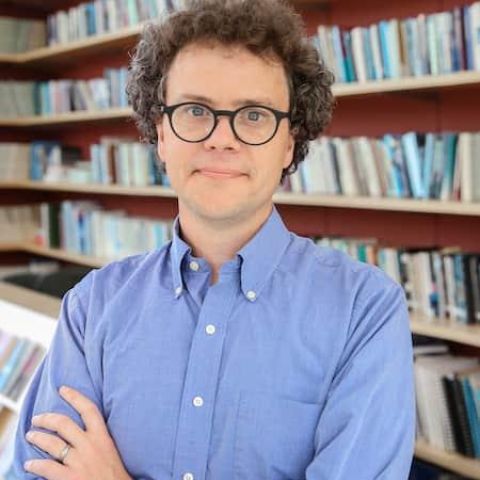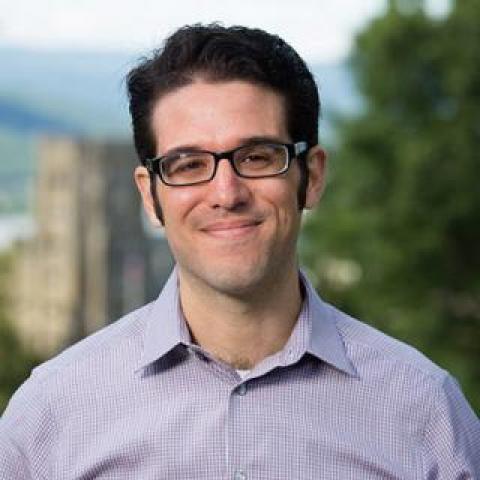LACS Steering Committee
Kenneth Roberts

Richard J. Schwartz Professor, Government
Kenneth Roberts teaches comparative and Latin American politics, with an emphasis on the political economy of development and the politics of inequality. His research focuses on political parties, populism, labor and social movements, and democratic resilience. He is especially interested in the cases of Chile, Peru, Venezuela, and Argentina.
He led the Einaudi Center's democratic threats and resilience global research priority in academic years 2022–25.
Additional Information
Carolyn Fornoff

Associate Professor, Romance Studies
Carolyn Fornoff is an assistant professor in the Department of Romance Studies in the College of Arts and Sciences. Her research explores cultural responses to the environmental crisis in Latin America, with a particular focus on Mexico and Central America. It asks how art helps narrate and make sense of problems like climate change that are temporally expansive and often difficult to see with the naked eye.
Additional Information
Julie Ficarra

Associate Teaching Professor
Julie Ficarra specializes in critically examining global issues of migration, social inclusion, and sustainable development, focusing on comparative and ethical frameworks to foster cross-cultural understanding, social policy analysis, and community engagement. She is interested in the role of education in the development of global citizenship, peace, and reconciliation in post-conflict regions.
Additional Information
Program
Role
- Faculty
- LACS Core Faculty
- LACS Steering Committee
- PACS Faculty Associate
Contact
Email: jmf389@cornell.edu
Alex Nading

Director, Latin American and Caribbean Studies Program
Alex Nading is a medical and environmental anthropologist in the College of Arts and Sciences. His research, mostly focused on Nicaragua, has examined transnational campaigns against dengue fever, bacterial disease, and chronic kidney disease, as well as grassroots movements to address these issues.
He is the former editor (2021-24) of Medical Anthropology Quarterly and author of two books, "Mosquito Trails: Ecology, Health, and the Politics of Entanglement" (2014) and "The Kidney and the Cane: Planetary Health and Plantation Labor in Nicaragua" (2025).
Additional Information
Program
Role
- Faculty
- LACS Core Faculty
- LACS Director
- LACS Steering Committee
- Einaudi Faculty Leadership
Contact
Email: amn242@cornell.edu
Judith Byfield

Judith and Madeline Anbinder Professor
Judith Byfield’s primary research focus is women's social and economic history in Nigeria. Her research includes in-depth studies on tie-dye production, World War II, Nigerian women's political activism and nationalism.
She is currently a Fulbright Global Scholar beginning a new project, "Curry Goat and Gari: West Indian Women in 20th-Century Lagosian Society." It is inspired by the West Indian women she met during her research trips to Nigeria.
Additional Information
Matthew Velasco

Associate Professor, Anthropology
Matthew Velasco is an anthropological bioarchaeologist who studies ancient populations of the Peruvian Andes through the analysis of their skeletal remains. His research explores the emergence of novel ethnic identities and cultural traditions during the era preceding and encompassing Inka imperial expansion in the 15th century. To explore how these dynamic social transformations impacted the lived experience of the body and its treatment at death, he analyzes and interpret indicators of social identity, biological relatedness, diet, and health status written on the human skeleton.
Additional Information
Irina Troconis

Assistant Professor, Romance Studies
Irina Troconis’s areas of specialization include: Memory Studies, Venezuelan Studies, Politics and Performance, Affect Theory, and Digital Humanities. Her book project, Spectral Remains: Memory, Affect, and the State in the Afterglow of Hugo Chávez’s Bolivarian Revolution, explores through the lens of spectrality the memory narratives and practices developed around the figure of Venezuelan president Hugo Chávez in the seven years following his death. She is also working on two new research projects. The first examines the performance work of Venezuelan artists in the diaspora.
Additional Information
Cecilia Lawless

Senior Lecturer and Stephen H. Weiss Provost’s Teaching Fellow, Romance Studies
Cecelia Lawless teaches both language and literature/film courses as a senior lecturer. For several years, she was the faculty fellow for the Spanish Language House at Alice Cook. For five years, she helped to found and then serve as Director of the Foreign Language Across the Curriculum Program (FLAC) that offers Spanish language sections in conjunction with established courses in a variety of disciplines. Lawless has participated in and is now Director of the successful Summer Program in Madrid.
Additional Information
Gustavo Flores-Macías

Professor, Government and Public Policy
Gustavo Flores-Macías's research and teaching interests include topics related to political and economic development. His research focuses on the politics of economic reform, taxation and state capacity, and populism and the militarization of law enforcement.
Additional Information
Timothy DeVoogd

Professor Emeritus, Psychology
Timothy Devoogd studies how the brains of birds encode learned behaviors like song or memory for food locations. Particular questions now being studied include the neural basis for female song discrimination, and the interplay between the hippocampus and other brain areas in spatial memory. He studies these questions in a variety of species in order to infer how these abilities evolved.
Additional Information
Program
Role
- Faculty
- LACS Core Faculty
- LACS Professor Emeriti
- LACS Steering Committee
Contact
Email: tjd5@cornell.edu
